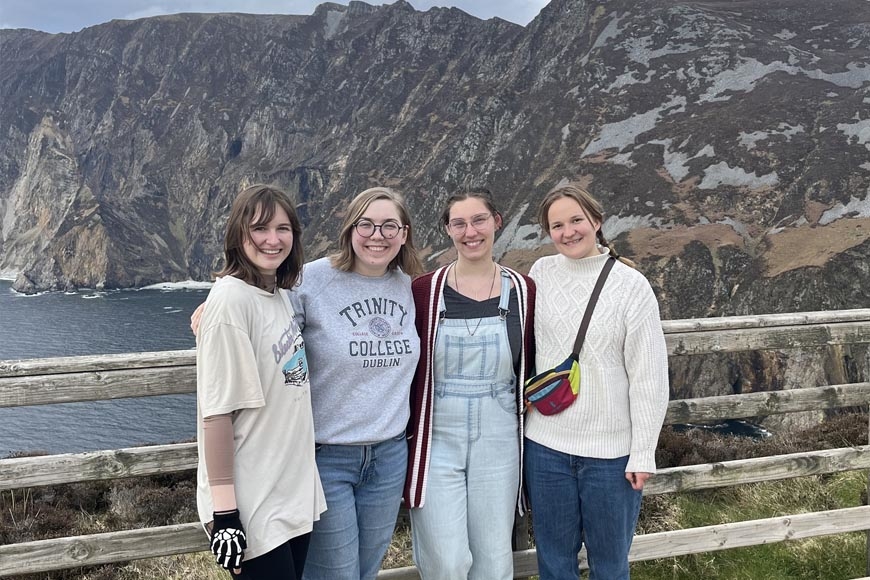Drama in Dublin: Theatre Students on Studying Abroad
Home of Maeve Binchy, Samuel Beckett, James Joyce, Oscar Wilde, George Bernard Shaw, and a long list of other iconic dramatists, Dublin is a dream destination for those who wish to study theatre. The Department of Theatre Arts & Dance’s BA Dublin program provides a cohort of students with the opportunity to spend a semester immersing themselves in the artistic culture of the Irish capital. Three of those students share how this experience enhanced their on-campus coursework, helped them forge friendships, and expanded their theatrical horizons.
Foundations For a Theatrical Future
“I’ve been doing theatre since I was eight years old and, as cliche as it sounds, I’ve always felt really at home.” Julianna Bruemmer spent much of her freshman year trying to settle on a major. She explains that “it wasn’t until I came to the theatre program at the U that I rediscovered what I truly wanted to do with my life: theatre.”
Stella Mehlhoff, an English major and theatre arts minor, has also been performing since childhood. “It's a really cool place to find community and artistic expression and also to build empathy,” she explains, “Because when you're working so closely with these varied stories and characters, you get a chance to broaden your own perspectives. So I knew in college I wanted to keep that a part of my life.”
Both feel that the University’s theatre department has set them up for a wide range of future possibilities. “The BA program has given me so much in my last three years,” Bruemmer says. “I feel more confident in my abilities, not only as an actor, but as a writer, director, dramaturg, etc. The BA program doesn’t just prepare you for one thing, it prepares you for many… I feel like no matter what I choose to do, I will be able to find work in the industry.” Mehlhoff enjoys the program’s emphasis on independent creation through its acting, devising, and writing classes, which have made her “feel more confident about not just following someone else's lead but also leading a theatrical project.” She appreciates learning in a liberal arts context, where “you're also getting all these different kinds of inspiration from your other classes to give you source material.”
The Dublin study abroad program, offered by the department each spring semester, seemed like a perfect way to build on what the students had learned at the University. Bruemmer explains, “I had taken many classes that talked about influential works in theatre history and classes about different styles of acting and theatre, which provided good context going into this semester.” Mehlhoff appreciated the change of pace provided by studying abroad. “I really wanted a challenge and I wanted a new perspective. I think when you're working in the same environment for too long, it can be easy to just get sort of stagnant.”
For theatre major Kylie Howatt (BA ‘24), time was a motivating factor. “This was my last semester,” she explains, “and I wanted to push myself out of my comfort zone before graduating and entering the professional world.” She wanted to experience a different type of education by “learning about theatre from a new perspective and [seeing] how it might differ from what I had been taught in America.”
A City Brimming With the Arts
Bruemmer, Howatt, and Mehlhoff were part of a twelve-student BA Dublin program cohort that spent four months in Ireland and worked with program partner The Gaiety School of Acting. Students lived together as roommates, and Bruemmer says that they “connected more as a group because of our small number and close proximity.”
Studying with a cohort allowed the students to better connect with their theatre community. “Being a theatre minor, at home it could feel like I was kind of on the periphery of the main social life,” Mehlhoff explains. “But in Dublin, it was really exciting to actually be able to get to know everyone individually.” Bruemmer, who is also majoring in English, says, “I find it difficult to participate in BA activities in the theatre program because I’m so busy. However, this semester offered me the chance to get to know my fellow students more.” With students taking similar schedules, they were able to bond over discussions about their lessons. “Learning alongside other BA students also helped me feel more comfortable in my classes,” Howatt says.
As they strengthened existing connections, students made brand-new ones. Mehlhoff’s favorite part of studying abroad was “all the people that I've gotten to meet. I have friendships that are still in my life, people that I would love to go visit and reconnect with. And I think that it's really amazing to have relationships in different countries and across the world.”
A major takeaway for Mehlhoff was the city’s profound love of theatre. “Dublin has been such a cool place to study theatre because literature and theatre are so alive in that city. I would go to a book launch and it would be so packed people would have to line up outside.” Dublin’s appreciation for the arts is incorporated into classes, too, with new plays frequently included in coursework. “It was really exciting to see how much people cared about the arts in Dublin,” Mehlhoff says. “And that inspired me to think about how we might build that kind of enthusiasm in the States as well.”
Students can further immerse themselves in the Dublin theatre community through internships. Howatt worked with the Dublin International Film Festival, and while at first she “was worried that I would not be able to find a way to help or be able to make my skills apparent,” she quickly grew comfortable with the position. “The festival week was the most busy and tiring for me, but it was also rewarding,” she recalls. “Each day, I was excited to be a part of the festival and when my internship came to an end, I was most surprised by how fulfilling the whole experience had been.”
Immersion in Dublin’s theatre community went hand-in-hand with immersion in the culture. Students often learned about Irish culture and traditions through their studies. “I found myself noticing a lot of themes in the Irish plays that we saw and read,” Mehlhoff says. “Irish theater uses ghosts or ghost-like figures to talk about things like grief or generational trauma. It’s cool to see these new vehicles and think about how I might incorporate that into my own work as well.”
By staying for an entire semester, students could live in Dublin rather than simply visit as tourists. “When I left, I felt like I was leaving with more than just grades and experiences,” Bruemmer says. “I really felt like I had learned more about myself and what I wanted to do, and that’s all because of my experiences abroad.”
A System of Support
Of everything she encountered on her trip, Mehlhoff was most surprised by the fact that “it wasn't as much of a struggle as I thought it would be.” She explains that she was bracing herself “for feeling lost all the time, and homesick.” Fortunately, “the programs I chose and the people I was with were very welcoming and supportive. So it didn't end up being quite as personally difficult as I might have expected. I felt like it was just very exciting and rewarding, largely.”
Howatt also observed that the program helped ease the transition to a new temporary home. “I knew a majority of my classmates before going to Ireland,” she says. “This helped me acclimate to a new culture more easily and comfortably than if I were to have gone on a different program.”
All three students were especially thankful for the aid provided by study abroad scholarships. Mehlhoff, who was able to apply a variety of scholarships to the trip, explains that “scholarships have made my whole University experience possible. I really wouldn't even be able to study here much less abroad without scholarships, or if I was I would be going into a mountain of debt.” Not only did scholarships allow her to join the program, but they helped ease worries about money during her time abroad. Citing extra performances she saw in Dublin and London, Mehlhoff says, “If I hadn't had that support, I think I would have been a lot more stingy with what I allowed myself to see and do, [even though] the point of study abroad is to broaden your horizons.”
Bruemmer and Howatt received scholarships from the Department of Theatre Arts & Dance. “Receiving a scholarship in theatre was beneficial because it showed me that my pursuit of a creative career was supported,” Howatt says. “Unfortunately, creative fields like theatre struggle to find the support needed to nurture careers and establish ways for students and young people to find their way into creating in the long term.” Bruemmer echoes Mehlhoff’s observations, saying “Because of the aid I received, I was able to explore not only Dublin, but Ireland as a whole. The scholarships helped take a burden off my shoulders about program fees and I was able to focus more on enjoying myself and making the most out of this opportunity I was given.”
For those considering sponsoring a scholarship, Mehlhoff says, “Know that it actually does make a really tangible difference. Study abroad is absolutely transformative, and it just wouldn’t be possible without that financial support.”
Bruemmer adds that, while every student deserves the chance to study abroad, many miss out because of a lack of financial aid, making these scholarships vitally important to their education. “These scholarships change lives,” she says, “and doesn't everyone want to do that?”
Theatre Arts Learning Abroad Scholarship
Support undergraduate students in CLA studying towards a degree in theatre arts or acting and participating in an approved study abroad experience.
This story was written by Max Pritchard, an undergraduate student in CLA.



